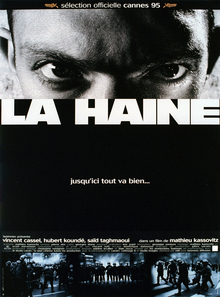 |
| Michel Serrault and Mathieu Kassovitz in Assassin(s) |
Mr. Wagner: Michel Serrault
Max: Mathieu Kassovitz
Hélène: Hélène de Fougerolles
Max's Mother: Danièle Lebrun
Léa: Léa Drucker
Mehdi: Mehdi Benoufa
Mr. Vidal: Robert Gendru
Inspector: François Levantal
Director: Mathieu Kassovitz
Screenplay: Nicolas Boukhrief, Mathieu Kassovitz
Cinematography: Pierre Aïm
Production design: Philippe Chiffre
Music: Carter Burwell
Perhaps no movie since
Network (Sidney Lumet, 1976) has sledgehammered television quite so thoroughly as
Assassin(s). But where
Network took the business of television for its target,
Assassin(s) aims at the medium's ubiquity and its desensitizing effect on viewers. It's not a novel point, of course, and even the spin writer-director Mathieu Kassovitz decides to give it -- the effect TV has in creating a culture of violence -- is neither fresh nor unquestioned. The story at the film's center is about an aging professional hit man, Mr. Wagner, who takes on a young petty thief, Max, as his apprentice. It's set in the Parisian
banlieus that were the socio-political milieu for Kassovitz's earlier (and much better) film about violence,
La Haine (1995). It opens with Mr. Wagner guiding Max into the brutal and entirely gratuitous murder of an elderly man, and then flashes back to bring the story up to a recapitulation of the event -- rubbing our noses in it, so to speak. Max is a layabout and a screwup, but there is a core of reluctance within him that Mr. Wagner is determined to obliterate. Eventually, Max takes on his own protégé, a teenager named Mehdi, who is decidedly not reluctant to engage in a little killing, seeing it as just an extension of the video games he plays. Throughout the film, television sets are blaring game shows, commercials, sitcoms, and even nature documentaries in the background, an ironic if sometimes heavy-handed counterpoint to the murders committed by Mr. Wagner, Max, and Mehdi. Kassovitz stages much of the film well, extracting full shock value, and he sometimes embroiders the realism of the story with surreal touches: At one point, when Mr. Wagner is walking away from Max, we see a demonic tail emerge from beneath Wagner's overcoat -- or is it Max, perpetually stoned, who sees this? More effectively, reinforcing Kassovitz's treatment of the effects of television, Mehdi -- who is coming unglued after his first commissioned hit -- watches a TV sitcom about a group of young people that suddenly turns into violent, necrophiliac pornography, accompanied by a laugh track. Kassovitz showed undeniable talent with
La Haine, and some of it is on display here.
Assassin(s) was booed at the Cannes festival, and has never received a wide commercial release in the United States, but it's something of a fascinating (if often repellent) failure.



